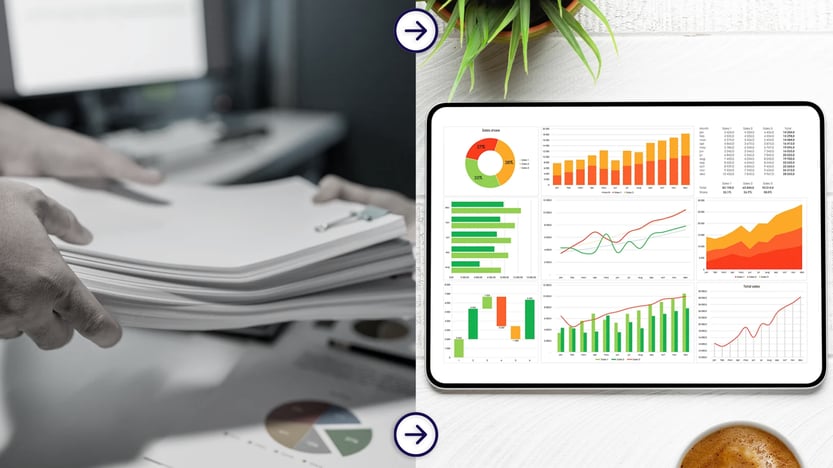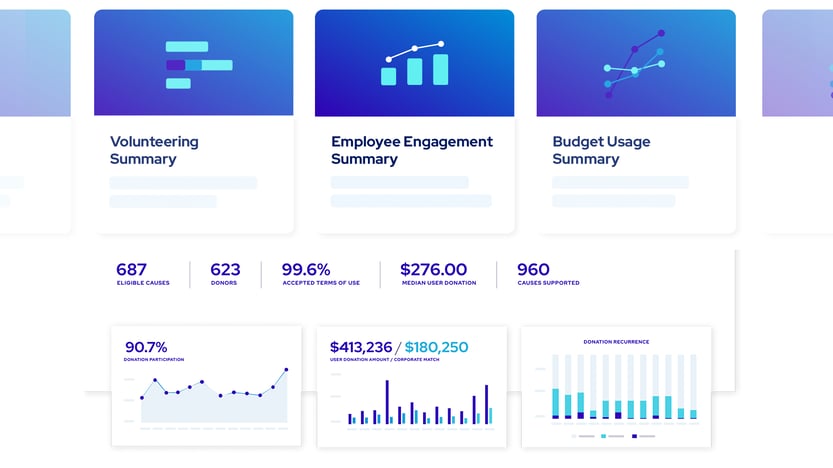The challenge: Reporting that can’t keep up
Corporate social responsibility (CSR) and social impact programs are designed to create meaningful change. But too often, reporting struggles to keep pace, making it hard for companies to measure impact, prove ROI and scale initiatives. Here’s what’s getting in the way:
1. Fragmented initiatives create fragmented impact

Many CSR programs have grown organically over time — starting with employee giving, then volunteering, then grantmaking — each managed separately with different teams, tools and strategies. While each initiative creates value, the lack of alignment leads to:
- Disconnected impact measurement: Without a unified reporting structure, it's difficult to assess whether initiatives are working together toward your company’s goals.
- Missed opportunities for strategic alignment: You can’t optimize what you can’t see. Siloed programs make it hard to maximize your investment.
- Limited ability to scale: As programs grow, so do the inefficiencies — making it harder to expand your impact.
2. Inconsistent reporting leads to missed insights

When each initiative has its own reporting method, it creates more than just inefficiencies — it prevents companies from fully understanding their impact:
- No cross-program insights: Without a standardized reporting system, you lose the opportunity to apply learnings from one initiative to inform and improve another.
- Partial view of impact: Reporting separately on volunteering, giving and grantmaking makes it nearly impossible to see the full picture of corporate impact.
- Cumbersome & costly ESG reporting: Pulling together environmental, social and governance (ESG) reports requires consolidating data from disparate sources — increasing costs, complexity, and time investment.
3. Time-consuming data collection creates bottlenecks

Manually collecting and consolidating data across multiple CSR initiatives wastes time and resources that could be better spent on driving impact:
- Delayed decision-making: When it takes weeks or months to gather, clean and analyze data, teams struggle to make timely, informed decisions.
- Strain on internal teams: CSR and ESG teams often rely on manual data entry, spreadsheets and back-and-forth communications to pull reports, leading to burnout and inefficiencies.
- Risk of errors and inconsistencies: The more manual the process, the higher the chance of errors, making reports unreliable and harder to trust.
Slow data collection and reporting don’t just waste time — they slow down progress. Without streamlined reporting, companies lose opportunities to optimize programs, secure leadership buy-in and take action based on data-driven insights.
How end-to-end visibility transforms reporting

A connected reporting system changes everything, eliminating silos, increasing efficiency and unlocking deeper insights. Companies that unify their CSR data can:
- Align every initiative to corporate goals: See how giving, volunteering, or grantmaking all contribute toward the company’s broader impact objectives.
- Make informed, data-driven decisions faster: Spot trends, adjust strategies and make smarter decisions with up-to-date data and insights.
- Simplify ESG and leadership reporting: Save time and reduce headaches with standardized, automated reports for executives and stakeholders.
- Tell a stronger impact story: Prove ROI, win internal support and showcase your impact clearly and credibly.
By removing reporting inefficiencies and connecting the dots across CSR programs, companies can maximize impact, save time and elevate their social responsibility strategy.
Benevity Reporting Studio: A unified reporting solution for enterprise impact

Benevity’s Reporting Studio gives you a unified view of your CSR programs. It’s designed to help you report smarter, act faster and scale your impact.
Key benefits:
All your data in one place: Pull together insights from employee giving, volunteering and grantmaking in a single platform. This eliminates data silos, providing a comprehensive view of your total impact.
Customizable, automated reporting: Generate reports tailored to your needs, without the manual lift.
Betterstakeholder engagement: Share clear, compelling reports with employees, customers and partners. This transparency fosters trust and encourages greater participation in your programs.
Scalability and adaptability: Expand your programs and evolve your strategies as your company grows. Reporting Studio’s adaptable nature ensures that your impact initiatives remain effective and relevant.
Less admin, more action: Spend less time gathering data and more time driving change by automating data collection and reporting processes.
Informed decision-making: Use real-time insights to optimize programs and investments. Data-driven decisions are always the best decisions. Reporting Studio transforms how your organization manages and measures its social impact, leading to more strategic initiatives and a stronger alignment with your corporate purpose.
Take a data - driven approach to impact

A strong reporting strategy doesn’t just prove impact, it powers it. With unified, automated insights, you can:
- Make smarter investment decisions based on meaningful data.
- Build trust with stakeholders through transparent impact reporting.
- Increase employee engagement by demonstrating the tangible outcomes of their contributions.









